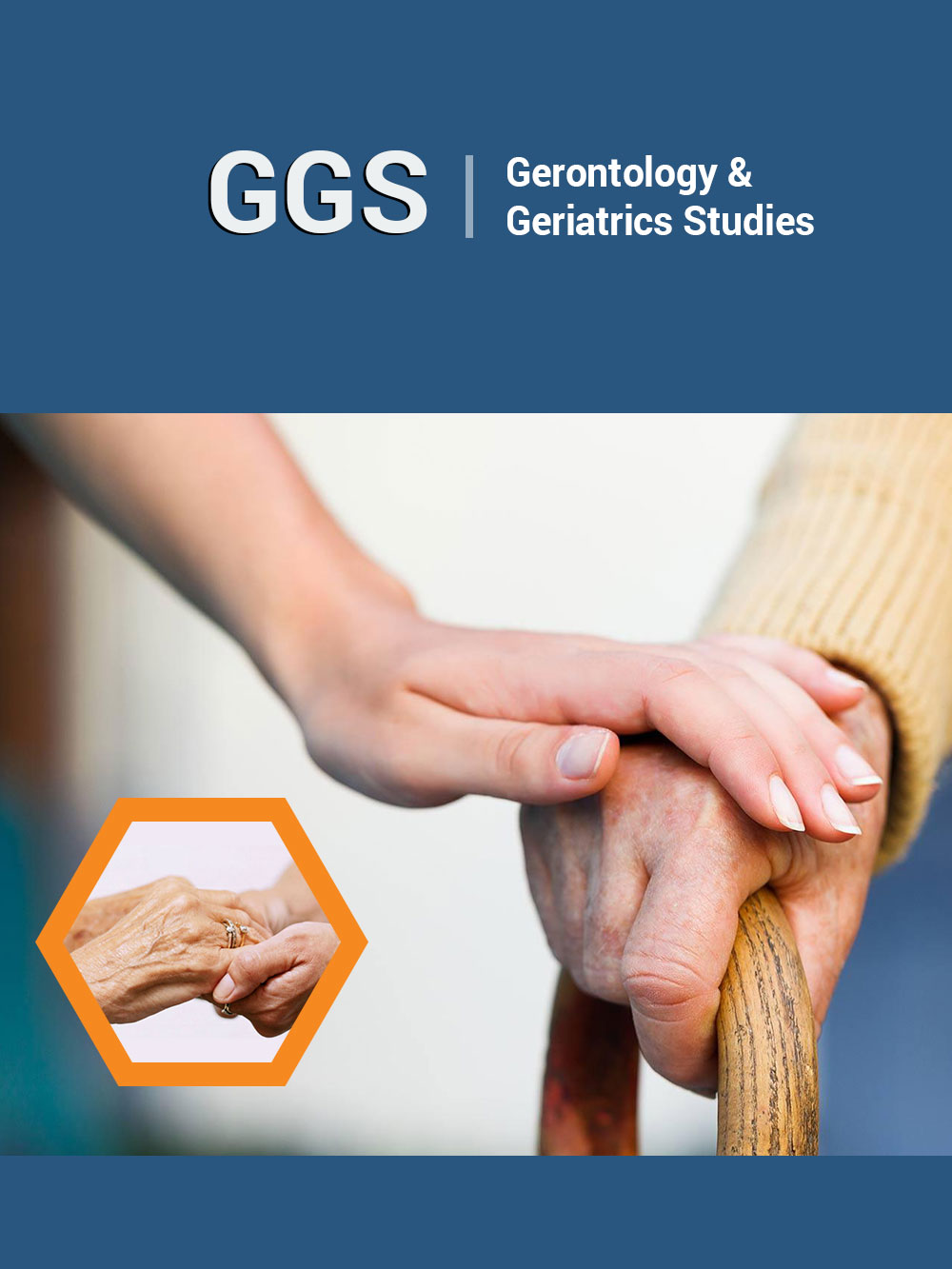- Submissions

Full Text
Gerontology & Geriatrics Studies
Utilizing Grandfathers to Support Grandchildren: Intergenerational Fathering
Jeffrey Shears*
Director of Graduate Studies, USA
*Corresponding author: Jeffrey Shears, Director of Graduate Studies, USA
Submission: September 16, 2019;Published: September 20, 2019

ISSN 2578-0093Volume5 Issue2
Mini Review
In the late 1990’s there was a focus of federal agencies to promote and understand father involvement. Through this effort there have been numerous studies that highlight the impact fathers have in the lives of their children. These studies show that the impact of fathers on healthy development of children is vital as children generally express fewer negative behaviors when there is positive father involvement [1]. The father’s playful engagement with his child, financial support of children, and positive father-child interactions are some of the factors that influence healthy child development [1,2].
As we expand this inquiry of fatherhood research it is important to begin to understand grandfathers’ impact on grandchildren. Much of the historical research on grandparents have highlighted women and the care they provided to families [3]. More recent work has highlighted the important factors in studying grandfathers and their contributions to children’s development. It is also important to highlight the potential roles grandfathers can play in the lives of children. Grandfathers direct involvement with grandchildren’s development appears to be a transgenerational phenomenon based on research which encompasses Erickson’s generativity theory. It suggests that there are favorable developmental outcomes of the younger generation when older adults are involved [4]. Grandfathers may offer positive emotional support and financial support that improve emotional stability with grandchildren [5].
Bates et al. [6] theoretical explanation suggests that there are three components “frequency of contact”, “participation in activities”, and “grandfather’s commitment” to the grandfather’s involvement with grandchildren. There have been contradictory findings indicating that more work is needed to pinpoint the exact cause of grandfather’s transgenerational influence [4]. For example, Dunn et al. [7] conducted a qualitative study showing significant relationship improvement when grandparents were involved with the grandchildren of new parents, however they recognized that factors may have changed the dynamics of the family system such as the new child itself.
Although grandfather’s influence of their grandchildren may derive from direct contact and frequent interactions, their influence may also come from how they influence their own son’s fathering behaviors and parenting attitudes. Intergenerational fathering is the phenomenon of how fathers can impact their son’s fathering behaviors. There are several aspects that influence father’s parenting behaviors and attitudes, i.e. mothers, family of origin, and peers with possibly the biggest influence being one’s own father [8]. Several intergenerational fathering studies have identified that men who report having positive relationships with their fathers will display similar behaviors and parenting attitudes with their own children [9-11]. Pleck et al. [12] theorizes that even when fathers have a fragmented relationship with their father these men might either compensate for not having an ideal fathering experience or emulate this fragmented experience with their own children.
Having a better understanding of how grandfathers might influence their son’s parenting has significant influences on families. Understanding the potential resource grandfathers can be to younger children through the father has implications for social policy. In short, how can we intentionally utilize grandfathers as a resource for the next generation. Grandfathers can offer direct financial benefit, support, child rearing and affection and support to their grandchildren. Furthermore, grandfathers may be just as influential to their grandchildren through their direct influences on their sons to become positive and involved fathers. Further research is needed to understand both the direct and indirect influences grandfathers have on the next generation.
References
- Fagan J, Kaufman R, Dyer WJ (2019) Conceptualizing and measuring low-income, nonresident fathers’ contact with children. Monographs of the Society for Research in Child Development 84(1): 94-106.
- Kroll M, Carson C, Redshaw M, Quigley M (2016) Early father involvement and subsequent child behaviour at ages 3, 5, and 7 years: Prospective analysis of the UK millennium cohort study. PLOS ONE 11(9): 1-17.
- Bullock K (2005) Grandfathers and the impact of raising grandchildren. The Journal of Sociology and Social Welfare 32(1): 43-60.
- Bates J, Taylor A (2013) Grandparent involvement: Contact frequency, participation, and commitment. The Journal of Men’s Studies 21(3): 305-322.
- Transkanen A, Danielsbacka M (2018) Multigenerational effects on children’s cognitive and socioemotional outcomes: A within-child investigation. Child Dev 89(5): 1856-1870.
- Bates J, Taylor A, Stanfield M (2018) Variations in grandfathering: Characteristics of involved, passive, and disengaged grandfathers. Contemporary Social Science 13(2): 187-202.
- Dunn T, Sears C (2017) Relational trajectories from parent and child to grandparent and new parent. Journal of Family Communication 17(2): 185-201.
- Summers JJ, Boller K, Laughlin B (2006) Exploring fathering roles in low-income families: The influence of intergenerational transmission. Families in Society: The journal of Contemporary Human Services 87(2): 259-268.
- Brown GL, Kogan SM, Kim J (2017) From fathers to sons: The intergenerational transmission of parenting behavior among African American young men. Fam Process 57(1): 165-180.
- Cowan CP, Cowan PA (1992) When partners become parents: The big life change for couples. Basic Books, New York, USA.
- Hofferth SL, Pieck JH, Vesely CK (2012) The transmission of parenting from fathers to sons. Parent Sci Pract 12(4): 282-305.
- Pleck JH (1997) Paternal involvement: Levels, sources, and consequences. In: Lamb ME (Ed.), The role of the father in child development, (3rd edn), Wiley Shears, New York, USA, pp. 66-103.
© 2019 Jeffrey Shears. This is an open access article distributed under the terms of the Creative Commons Attribution License , which permits unrestricted use, distribution, and build upon your work non-commercially.
 a Creative Commons Attribution 4.0 International License. Based on a work at www.crimsonpublishers.com.
Best viewed in
a Creative Commons Attribution 4.0 International License. Based on a work at www.crimsonpublishers.com.
Best viewed in 







.jpg)






























 Editorial Board Registrations
Editorial Board Registrations Submit your Article
Submit your Article Refer a Friend
Refer a Friend Advertise With Us
Advertise With Us
.jpg)






.jpg)














.bmp)
.jpg)
.png)
.jpg)










.jpg)






.png)

.png)



.png)






